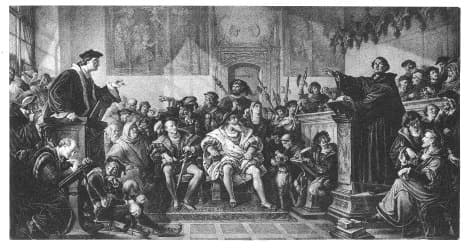The moment Luther became a heretic

On July 17th 1519, two men met in Leipzig's Pleissenburg Castle to battle out their opposing views on Christianity.
One of these men was Johann Eck - Dominican Friar, defender of Catholic doctrine and considered by many to be the best debater in Germany.
The other was Martin Luther – and July 17th marked Luther's entrance into a debate which would eventually see him excommunicated from the Catholic Church.
Born in Eisleben, Saxony in 1483, Martin Luther had spent years struggling to find true religious enlightenment.
Disillusioned by the corruption he witnessed among Catholic priests, Luther was a particular critic of the "sale of indulgences" – in which Christians were told to make financial payments to priests to atone for their sins.
On October 31st 1517, after yet another round of indulgences were announced to help pay for St Peter's Basilica, Luther decided to take action.
And when he posted his "Ninety Five Theses on the Power and Efficacy of Indulgences" on a chapel door in Wittenburg, he had a specific aim in mind: to protest against this clerical abuse within the Roman Catholic church.
By the summer of 1519, Luther's ideas had spread not only around Germany, but the whole of Europe.
Before July 17th, Eck had already launched a debate with Christian theologian Andreas Karlstadt to discuss Luther's teachings.
But within a few weeks, Luther himself was invited to join the discussion.
Up until this point, Eck and Karlstadt had mainly discussed Christian doctrines of free will and grace. But when Luther took to the podium on July 17th, the debate widened.
This was now a much broader discussion – on topics such as purgatory, the sale of indulgences, how penance should be paid, and how much authority the Pope should be granted.
During the debate, Luther asserted something particularly controversial: that scripture was the only true authority in Christianity – and that popes, councils and theologians were all subject to mistakes.
The head of the church is Christ, Luther proclaimed. No man can take up this authority.
Here was a direct attack on the Pope's authority – and an admission of heresy by Luther.
In 1520, the pope threatened Luther with excommunication. Luther publicly burned the letter. In 1521, Luther was officially declared a heretic.
Yet, while condemnation of Luther spread rapidly, so did support – and the debate has widely been considered a turning point both in German and Christian history.
Bringing questions about papal authority, penance and sin to the forefront, the Leipzig Debate of July 17th ultimately helped to initiate the Protestant Reformation which shattered Catholic Europe.
Comments
See Also
One of these men was Johann Eck - Dominican Friar, defender of Catholic doctrine and considered by many to be the best debater in Germany.
The other was Martin Luther – and July 17th marked Luther's entrance into a debate which would eventually see him excommunicated from the Catholic Church.
Born in Eisleben, Saxony in 1483, Martin Luther had spent years struggling to find true religious enlightenment.
Disillusioned by the corruption he witnessed among Catholic priests, Luther was a particular critic of the "sale of indulgences" – in which Christians were told to make financial payments to priests to atone for their sins.
On October 31st 1517, after yet another round of indulgences were announced to help pay for St Peter's Basilica, Luther decided to take action.
And when he posted his "Ninety Five Theses on the Power and Efficacy of Indulgences" on a chapel door in Wittenburg, he had a specific aim in mind: to protest against this clerical abuse within the Roman Catholic church.
By the summer of 1519, Luther's ideas had spread not only around Germany, but the whole of Europe.
Before July 17th, Eck had already launched a debate with Christian theologian Andreas Karlstadt to discuss Luther's teachings.
But within a few weeks, Luther himself was invited to join the discussion.
Up until this point, Eck and Karlstadt had mainly discussed Christian doctrines of free will and grace. But when Luther took to the podium on July 17th, the debate widened.
This was now a much broader discussion – on topics such as purgatory, the sale of indulgences, how penance should be paid, and how much authority the Pope should be granted.
During the debate, Luther asserted something particularly controversial: that scripture was the only true authority in Christianity – and that popes, councils and theologians were all subject to mistakes.
The head of the church is Christ, Luther proclaimed. No man can take up this authority.
Here was a direct attack on the Pope's authority – and an admission of heresy by Luther.
In 1520, the pope threatened Luther with excommunication. Luther publicly burned the letter. In 1521, Luther was officially declared a heretic.
Yet, while condemnation of Luther spread rapidly, so did support – and the debate has widely been considered a turning point both in German and Christian history.
Bringing questions about papal authority, penance and sin to the forefront, the Leipzig Debate of July 17th ultimately helped to initiate the Protestant Reformation which shattered Catholic Europe.
Join the conversation in our comments section below. Share your own views and experience and if you have a question or suggestion for our journalists then email us at [email protected].
Please keep comments civil, constructive and on topic – and make sure to read our terms of use before getting involved.
Please log in here to leave a comment.